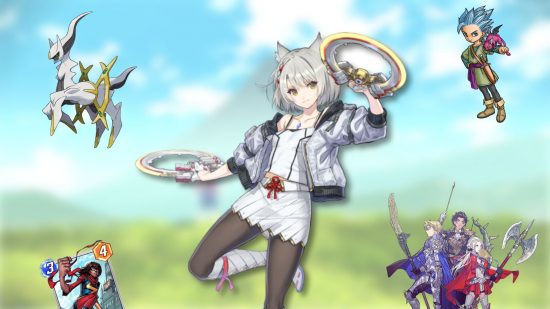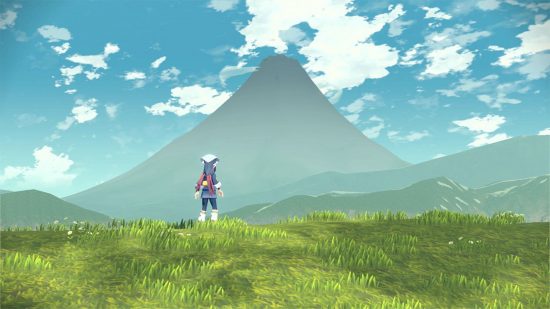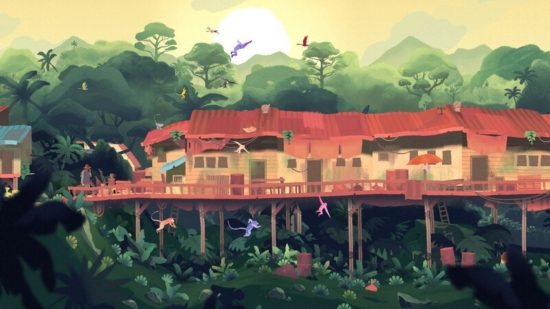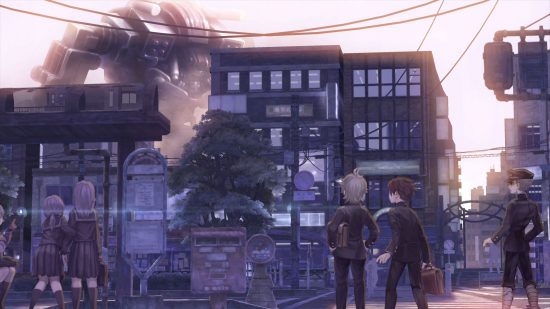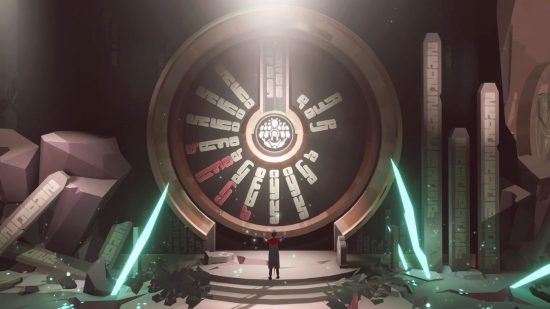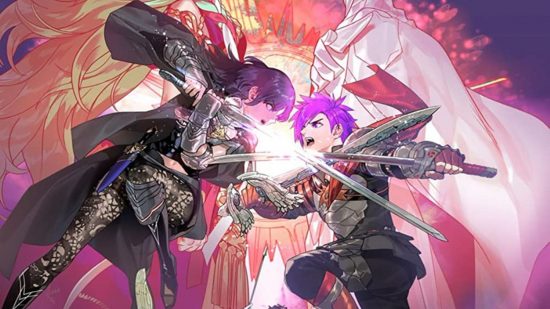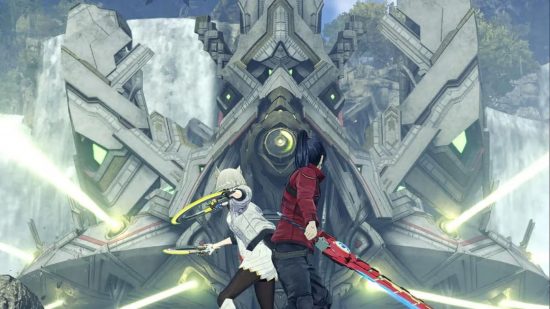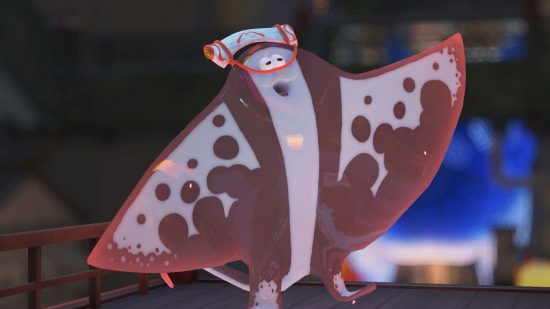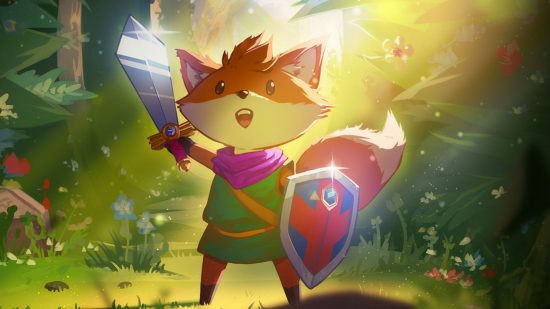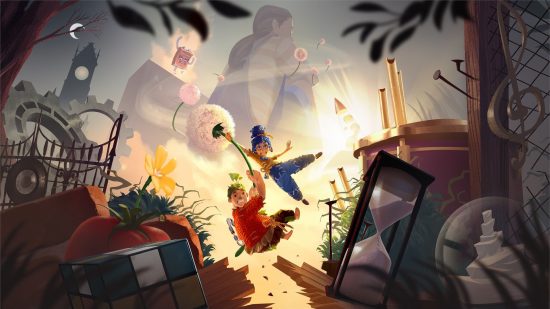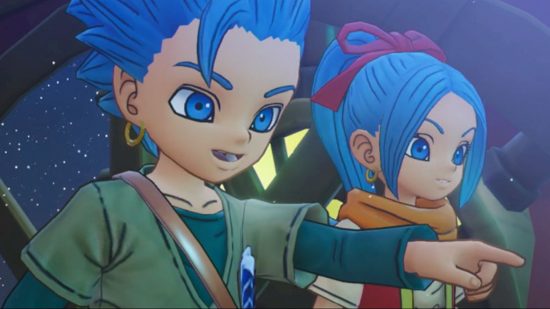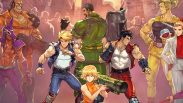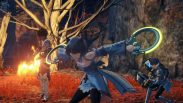As if like clockwork, the year has, as it must, come to an end. While some at Pocket Tactics are inclined to avoid cliche at as many turns as they can muster, there’s a sad reality we have to bear as our chilly country gets even chillier: people like to read about the year when it’s over. So, while every videogame writer and their aunt does the exact same thing, we too join in to offer our view on what 2022 means for us.
And when I say us, I mean videogame players of a specific variety. We play mobile games and Nintendo Switch games and then write about them. That’s our job. So, if I hear one complaint that there’s no mention of God of War or Elden Ring, my Christmas will be ruined.
Anyway, I keep mixing up whether to use the first-person pronoun as singular or plural as I try to muster up the energy to speak for a team of eight people. Either way, one thing isn’t mixed up: 2022 was a pretty average year for videogames, but we all still loved most of what we got.
The year started, as it is wont to do, in January, bringing with it the release of Pokémon Legends: Arceus. We thought that it’s “a must-play for any Pokémon fan. Not only does it offer a huge world full of gorgeous landscapes and great creatures, but it also features a fantastic origin story for Sinnoh”, as you can read in our Pokémon Legends: Arceus review.
This came alongside Yu-Gi-Oh! Master Duel and The Artful Escape, two games that passed by quite quietly, yet had much to offer anyone who gave them a chance. In a similar vein, Olli Olli World gave us a gorgeous, on-the-go skateboarding experience, one we truly adored, yet feels out of the conversation at this point in the year.
Olli Olli World kicked off February – yes, we’re going chronologically and slowly, whether you like it or not, buddy – a month that had a lot of little things to love yet no headliner. Grapple Dog was chill, Assassin’s Creed: The Ezio Collection was imperfect but welcome, while Atelier Sophie 2 kept the mysterious line of Atelier games in excellent form.
Uhh, we could also mention Kingdom Hearts Integrum Masterpiece for Cloud or Little Orpheus, but the latter was little more than just fine, and the former doesn’t make any sense. Why did they make a Kingdom Hearts videogame for the main character of Final Fantasy VII…? (It also isn’t a very good way to play those games, of course.)…
March was really fun, by my reckoning. Gibbon: Beyond the Trees? An excellently simple and emotive ecological tale. Potato Flowers in Full Bloom? A weird, interesting game that’s worth a look even if it’s not that good. Chocobo GP? Weird! The Ramp? We liked it! Rune Factory 5? The grandma of videogames! The variety of weird little things in March was beautiful fun.
And, to round it all out, Kirby got The Last of Us treatment and had to traverse a derelict, plant-infested platforming gauntlet. For some reason, no one is talking about it at this point in the year, but it’s incredible. Just read our 9/10 Kirby and the Forgotten Land review. It’s genuinely excellent.
April was similarly packed with excellent oddities and a few dips. Lego Star Wars: The Skywalker Saga and 13 Sentinels: Aegis Rim kicked off the month as two excellent videogames that have very little in common. How do you choose between them? Decide if you prefer Star Wars or Evangelion.
On the other hand, Chrono Cross: The Radical Dreamers made pretty much no impact beyond its original announcement – proving that, for the most part, it seems like people prefer talking about, knowing about, thinking about, and looking at videogames over actually playing them. Oh, and The House of the Dead Remake kinda sucked, too.
On the other other hand, Nobody Saves the World and Bugsnax ended the month with two beautiful indies, before May kicked off with The Stanley Parable: Ultra Deluxe. There’s nothing I can say about it, so let us say it in our The Stanley Parable Switch review, one of my personal favourites from the year.
Quickfire round, May edition: Eiyuden Chronicles Rising? “Eh, whatever”. Mini Motorways? “DinoPoloClub did it again! Though it’s not as good as that metro one”. Touken Ranbu Warriors? “Musou games are great!” Catalyst Black? “Definitely a videogame”.
Oh, and we have to highlight the near-perfect Opus: Echo of Starsong, a videogame so lovingly crafted, so full of simple, excellent storytelling, and so engaging on a basic mechanical level, that we gave it a 9/10. As you can see in our Opus: Echo of Starsong review, we love it, and we won’t hear a bad word about it, no matter how late it comes after the embargo.
Now, we could probably have a side discussion about the difficult reality of mobile games that we all got reminded of by Diablo Immortal, a fundamentally good game corrupted by manipulative money-making machinations. Yeah, we could have that discussion, but maybe that’s no fun. If you want it, our Diablo Immortal review kinda covers it.
June started with a subnautical monochrome indie called Silt, full of some fantastic platforming and puzzle-solving in its depths. Then, Mario Strikers Battle League shocked everyone because it was really fun (maybe the past tense is apt, here, however). Then we all remembered that Star Wars: Knights of the Old Republic II is better than the first, while Cloud Gardens made me want to buy a terrarium.
Fire Emblem Warriors: Three Hopes, the second Musou game of the year, also helped convince some more people that Musou games are actually good. Of course, they’re silly little toybox videogames where you throw together a bunch of fan-favourite characters and give them silky smooth slashes. But it’s also hyper-tactical, and it has a lot more to offer than the genre normally suggests, as we cover in our Fire Emblem Warriors: Three Hopes review.
Then, to kick off July, we got Poinpy, a game that was whisper-close to being our first ten of the year. In our Poinpy review summary, we say that with “expertly crafted and satisfying gameplay […] it feels like it was made in a lab by Heisenberg, Poinpy is just ridiculously fun to play, offers a huge amount of ways to customise your personal gameplay, and gives you a treasure chest of fun things to discover along the way.” Sounds pretty good.
Quickfire round, July edition: Monster Hunter Rise: Sunbreak? “MH is always good, more of it is always good”. Klonoa? “Old games are good!” Live A Live? “Our first ten out of ten of the year”. Coromon? “Like Pokémon, but you don’t recognise any of the monsters!” Xenoblade Chronicles 3? Uhh…
That’s our second ten out of ten of the year. Our Xenoblade Chronicles 3 review really says it best, but by way of summary, here’s what our reviewer (me), said: “Xenoblade Chronicles 3 has people with cat ears and people with horns, and I love it.” Uhh… I couldn’t agree more!
Then August rolled around with Digimon Survive, taking the series into a unique space with visual novel and horror elements, while Tower of Fantasy came to take Genshin’s crown and failed. Descenders took downhill biking to mobile in fine fashion, while Cult of the Lamb proved to us, once again, that some Switch ports don’t get the love they deserve.
We also saw We Are OFK fail to live up to its potential for inclusive storytelling and realistic character building; Frogun, Pac-Man World, and a bunch of TNMT games come back for another round, and; Cursed to Golf smooshed together sports and roguelikes in one of the best indies of the year.
September’s loudest act was Splatoon 3, bringing the inky multiplayer shooter closer to perfection (to paraphrase our Splatoon 3 review). While no new gimmick or magic trick ensued, the reality of Splatoon 3 is it’s better than Splatoon 2, and it’s definitely better than Overwatch 2. So it wins, and that’s all that matters.
Meanwhile, more monster collecting occurred with Temtem, which was cool, we got our second Yu-Gi-Oh game of the year in Cross Duel and it seems like no one plays it anymore, and everyone forgot about The Diofield Chronicle. Then, just in time for autumn, cutesy videogames Bear & Breakfast and Wylde Flowers came to give us a hug. Oh, and we also got a new Shovel Knight game.
Now, we could ask the question “why do they keep making Shovel Knight games?” But that would be a waste of time. We love Shovel Knight, and I’m sure the people who make those games sure love Shovel Knight too. They also probably really like money. Some amalgam of those various reasons is probably the answer to the question.
The other reason we shouldn’t ask that question is that Tunic also came out in September! How could we forget about Tunic? A game that “boasts satisfying and challenging combat, as well as a beautiful world rich with hidden treasures and forgotten knowledge, and revels in slowly giving players the pieces they need to explore its every corner”, as we say in our Tunic review.
We also got the best Nintendo Switch port of the year before September bit the dust, with our Nier Automata Switch review lovingly praising its beauty. Then, a few weeks later in a Yoko Taro interview, we learned all about his love of beer, lewd art, and big sausages (to paraphrase the man himself, of course).
Crikey, now it’s October, and there’s a triple threat on the way: Mario + Rabbids, Bayonetta 3, and Marvel Snap. All three could arguably receive game of the year. All three offer hours of fun and are created by some of the best devs out there. Hearthstone folks with Marvel characters? Sounds good! Bayonetta 3? I love voice-acting pay disputes! Mario + Rabbids got a sequel? It’s great when Mario wields a gun!
Then, by comparison, November looks like a deflated balloon. While It Takes Two “perfects the balance of give and take through its ingenuitive puzzles, stellar storytelling, and enchanting environments”, as we say in our It Takes Two review, it meant the month peaked early.
Harvestella is a “flawed but beautiful JRPG”, Sonic Frontiers is a “mixed bag of mixed bags”, while Wobbledogs “can do better.” None of these games is bad, per se, but fail to offer what we were looking for. There’s just not much to say other than “eh, whatever.”
Still, Tactics Ogre: Reborn made an already pretty game even prettier, even if it is still definitely a very old videogame. Then, to ring in December another old videogame appeared: Romancing Saga: Minstrel Song Remastered. That game is fine! These things are good if you like old games, which sure is good for me.
Oh, I forgot to mention Pokémon Scarlet & Violet before mentioning December. You know what, there’s not much to say. Pokémon Scarlet & Violet sure is another Pokémon game, that’s all I know for sure. For more, check out our Pokémon Scarlet & Violet review.
Then, as one final hurrah, Square Enix gave us Dragon Quest Treasures, the twenty-fifth game it put out in 2022. Our Dragon Quest Treasures review summary opened with one of my favourite words, so I’ll let it do the talking: “a rambunctious, treasure-filled adventure with that classic DQ charm, Dragon Quest Treasures embraces the world of its predecessors perfectly, while still setting itself apart.” Nice.
Oh, wait no. For some reason, Square Enix just can’t stop putting out games, so we also got Crisis Core: Final Fantasy VII Reunion, bringing us Switch owners whisper close to demanding that they put the Final Fantasy VII Remake in the palm of our hands, alongside our Crisis Core Switch review, one of my favourites from the year. Oh, and River City Girls 2 came out! Cool!
Okay so, looks like that’s the end of December, which by my calendar is the end of the year. What, by looking back at the year, have we learned? Uhh, videogames are pretty cool, I guess. That’s really all we’ve got. If you read all 2,000 words of this, well done. If you didn’t and skipped to the end hoping for a score, then you’re in luck.
2022 Pocket Tactics year-in-review
2022 was a year full of beautiful big(ish) videogames, a true event game in Xenoblade Chronicles 3, and a lovely smattering of old and indie in between. Nintendo kept on trucking, some truly gorgeous mobile games made some waves, and, best of all, Yoko Taro gave horny 2B art a big thumbs up. Nice.
